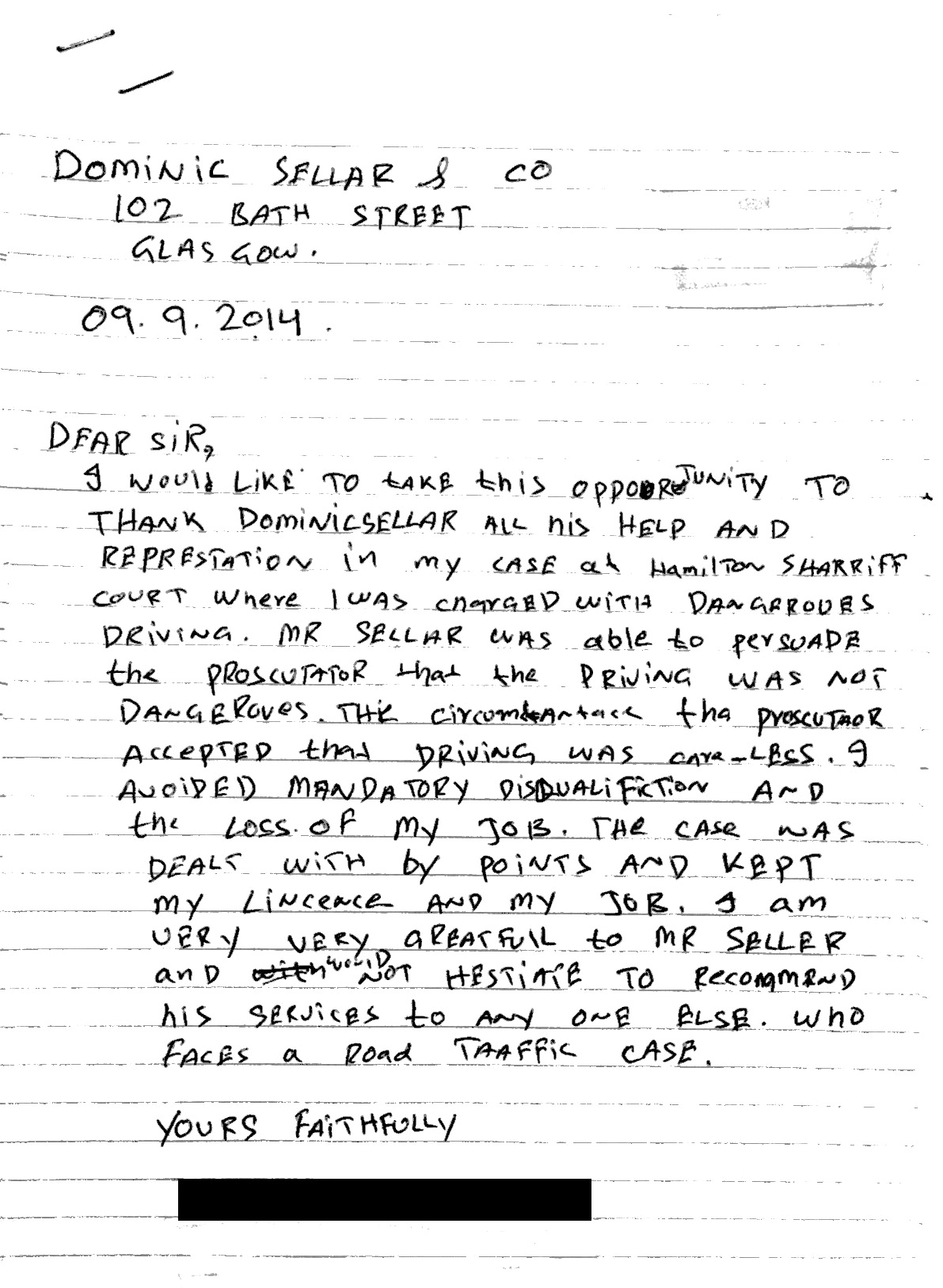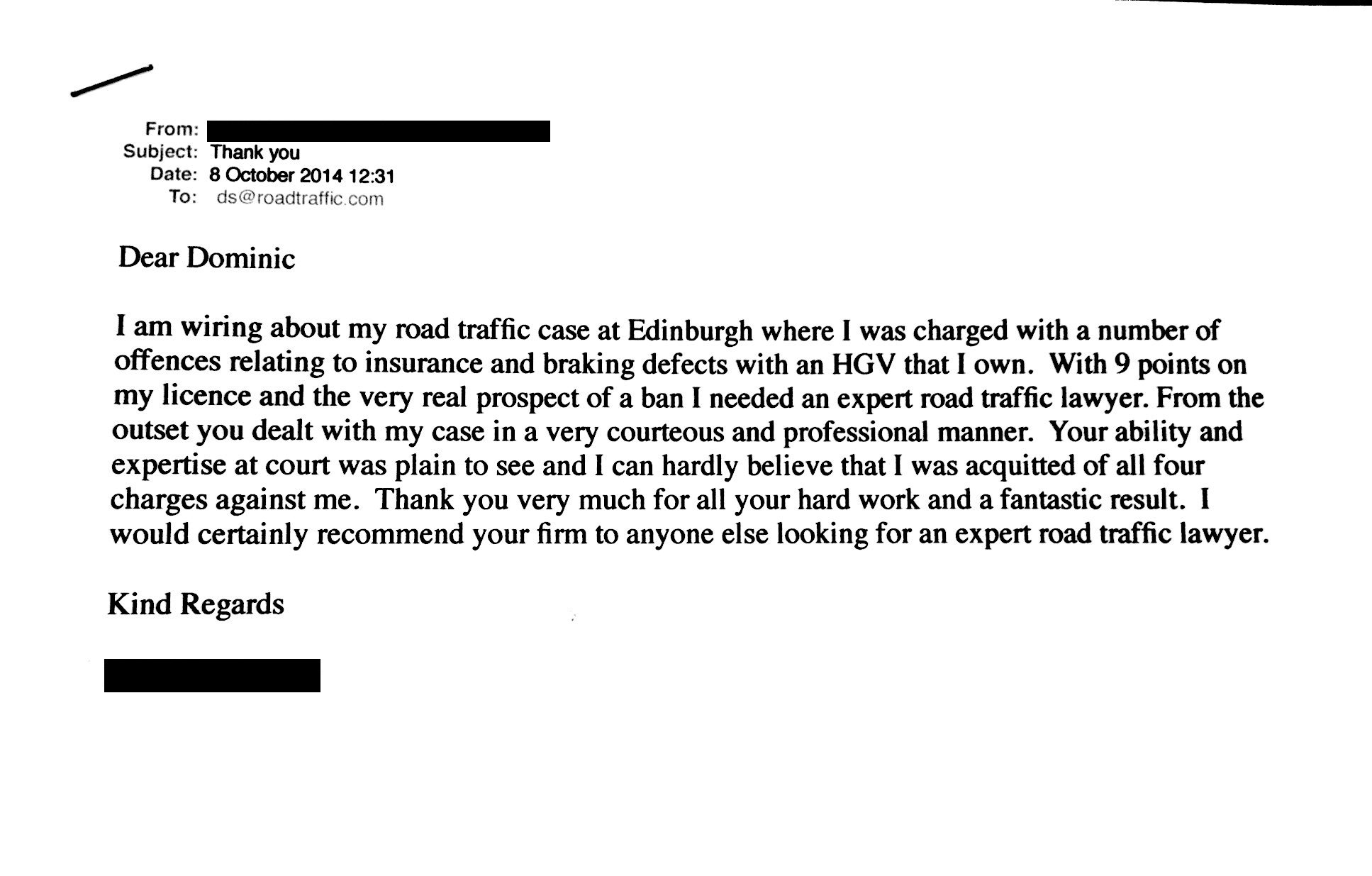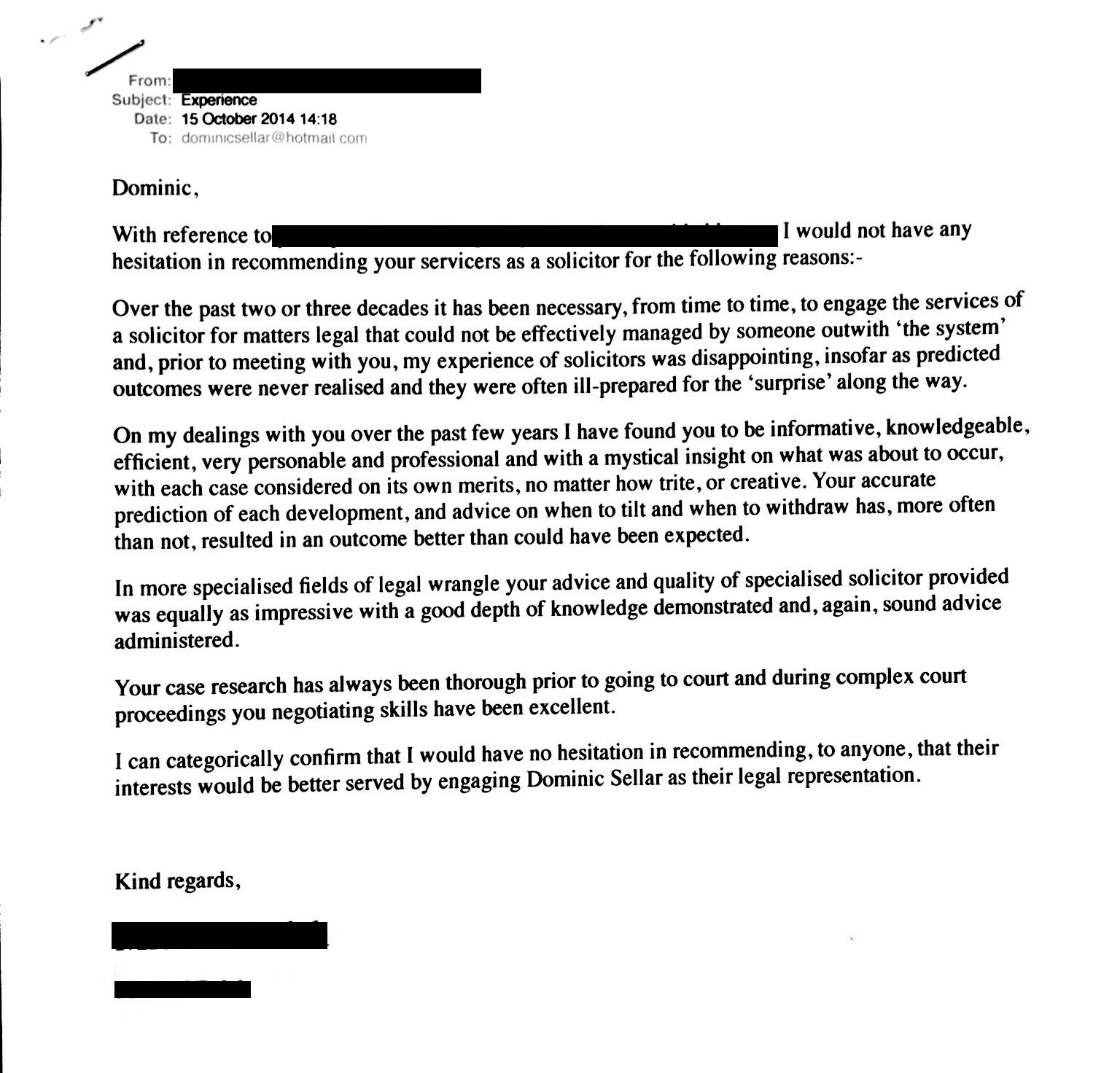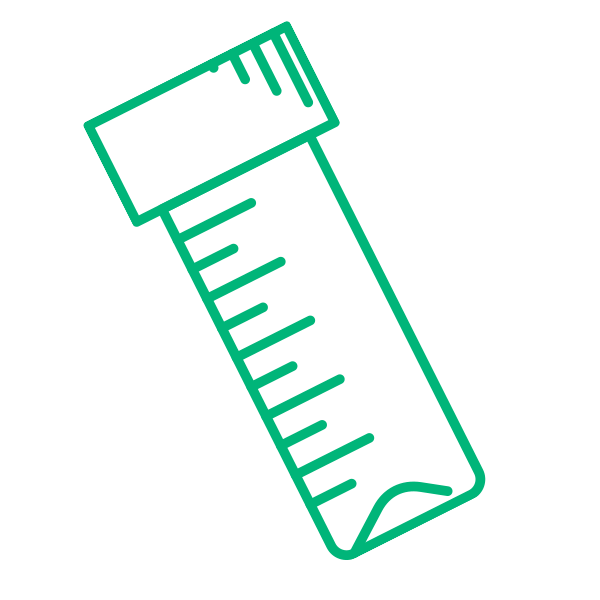Sections 6(6) & 7(6), Road Traffic Act 1988
Failing or refusing to provide a specimen of breath, blood or urine when required to do so by the police and, without reasonable excuse, is an offence. There are two separate offences that arise under this area of the law and different penalties apply:
- Failure to Cooperate with a Preliminary Test under Section 6 (The Roadside Test)
- Failure to Provide Specimen for Analysis under Section 7 (The Police Office Test)
Failure to Cooperate with a Preliminary Test under Section 6
The Preliminary Test or Roadside Test is the first stage in assessing whether a driver is over the legal limit for alcohol or under the influence of drink or drugs. In assessing whether someone has been drink driving the test is usually carried out by means of a handheld electronic device. Where the police suspect a driver is under the influence of drugs a Field Impairment Test may be used. Such a test may involve asking a driver to walk in a straight line and taking observations about their appearance, demeanour and their ability to carry out simple counting exercises. Another preliminary drug test involves taking a sample of saliva or sweat.
Failing the Preliminary Test
If a person fails the preliminary test or refuses to cooperate they will be arrested, taken to a police office and subsequently charged in terms of Section 6 of the Road Traffic Act 1988. A person can only be convicted if the prosecution can prove that the driver failed to cooperate. Failure includes refusal. The prosecution must also prove the driver had no reasonable cause or excuse for failing to cooperate with the preliminary test and that all the proper procedures were carried out. This is usually done by the arresting police officers who will give evidence that the proper procedures were followed and that there was no apparent reason why the driver did not cooperate with the preliminary test. Notwithstanding the police evidence, it is always open to a person charged under this section to claim that they have a Reasonable Excuse for failing to cooperate with the preliminary test.
Penalties
The penalties for failing to cooperate with a preliminary test include:
- A fine; and
- Discretionary disqualification; or
- 4 penalty points
Police Powers & Procedures
A police officer can request any person to cooperate with a preliminary test if he has reasonable cause to suspect that the person is, or has been, driving, attempting to drive or in charge of a vehicle while under the influence of alcohol or drugs. The police are also entitled to make such a request where a driver has been involved in an accident.
It is important to note that the legislation does not mean that the police can simply stop a driver at any time and insist on a preliminary test. Although the police can randomly stop any motor vehicle for a routine check they can only require cooperation with a preliminary test if they then form the opinion that the driver is under the influence. To this end the police often give evidence to the effect that the manner of driving was erratic, that the driver was unsteady on his feet and that his speech was slurred.
Failure to Provide Specimens for Analysis under Section 7
The requirement to provide a specimen of breath, blood or urine at a police office usually comes about because a person has failed the preliminary roadside test. The main purpose of this particular requirement is to obtain an accurate measurement of the amount of alcohol in a person’s system. The reading that is obtained will form the basis of any subsequent sentence that may be imposed. It is for this reason that failing to provide a specimen is treated as a serious matter and why the courts often impose penalties above the minimum.
Penalties
The penalties for failing to provide a specimen at the police office include:
- A fine and
- Mandatory disqualification of at least 12 months.
- A Community based disposal or imprisonment can also be imposed
The minimum period of disqualification increases to 3 years if a person has a previous drink related conviction within 10 years. If the charge stems from being Drunk in Charge-of a motor vehicle or there is evidence that the person was not driving the court can impose a shorter period of disqualification or endorsement of 10 penalty points.
Procedure at Police Office
At the police office the police will require a driver suspected of driving under the influence to provide two specimens of breath using an approved machine, such as the Intoximeter. In the normal course of events the police will use a form that provides guidance about the procedure that must be followed. Information and questions within the form should be read out to the person who is required to provide a specimen and his responses should be noted within the form at the time of the procedure.
The police must warn a person that failure to provide a specimen may render him liable to prosecution. The police must also provide adequate information about how to provide a specimen of breath.
The Intoximeter machine requires a person to provide a sufficient specimen of breath for the analysis to be carried out. If a person simply blows into the machine for a second or two the amount of breath given is unlikely to be enough for an analysis and may amount to a failure. Similarly, a person who pretends to blow into the machine or does so in a weak and ineffective manner will be regarded as having failed to provide a specimen. However, a person must be given a reasonable opportunity to provide a specimen.
A failure to provide a specimen includes a refusal. If a person refuses to provide a specimen the offence is immediately completed and he cannot thereafter change his mind by offering to provide a specimen. A driver does not have a right to choose to give a blood or urine sample instead of breath. A person’s agreement to give a specimen must be unequivocal and without condition.
Other Specimens – Blood or Urine
In certain circumstances the police may require a person to provide a sample of blood or urine as an alternative to breath. Failure to comply with such a request is also likely to result in criminal proceedings. Such a requirement can be made where:
- The police have reasonable cause to believe that, for medical reasons, a breath sample cannot or should not be taken;
- No reliable device or machine for taking breath samples is available or it is not practical to use such a device;
- The police have reasonable cause to believe the device has not produced a reliable reading of the level of alcohol;
- Following a preliminary test, the police have reasonable cause to suspect that the driver is under the influence of drugs;
- The police have been advised by a doctor or other medical practitioner that the driver’s condition may be due to drugs.
Defences
A defence of Reasonable Excuse is available for both offences. What amounts to a Reasonable Excuse will depend on all the facts and circumstances of each case. A reasonable excuse must be related to a physical or mental inability to provide a specimen or that to do so would involve a serious risk to health. Examples that might constitute a reasonable excuse and other arguable defences include:
- Pre-existing medical conditions which might prevent a person from providing a specimen of breath, such as asthma;
- Injuries suffered in an accident;
- Genuine phobias, such as a fear of needles;
- Mistakes in police procedure;
- Faulty breathalyser devices;
- Police conduct that is threatening or aggressive causing anguish and distrust.
Special Reasons not to Disqualify
As with other drink related offences there may be other mitigating circumstances that might persuade a court to refrain from disqualification or even endorsement of penalty points. These circumstances are called Special Reasons and reference should be made to that section within this site.

How we can help
The law relating to the provision of specimens is strictly applied and the penalties often include lengthy periods of disqualification. This area of the law is also technical and complex. A comprehensive knowledge of the law is essential for a successful defence. More often than not medical evidence will be required. Our experience and expertise in this area will quickly determine the best option for you. If there is no defence or the prospects of success are low we will tell you so and concentrate on mitigating the penalties. We pride ourselves in offering a service that is friendly, reliable and honest. For free advice that is without pressure or obligation simply contact us:
Call Now or Request a Callback
Independent Reviews
Go online or have a look at the reviews below to see why we’re the right solicitors for you.
Trustpilot
Google
Facebook
Client Letters
-
I honestly couldn’t praise Dominic enough!!
I honestly couldn’t praise Dominic and this fantastic company enough. I had direct communication from Dominic after I was recommended to acquire their services. Dominic was first class from the off, kept me updated through out and was an absolute gentleman. So my advice would be if you require any assistance in terms road traffic […]
-
Excellent lawyers firm.
I had a drink driving charge and speeding charge. I found Dominic Sellar & Co online. Dominic discussed my case with no obligation telephone consultation and advised me of what lay ahead. I decided to use his support & services.Dominic was not able to attend court on the day of my case but his partner […]
-
Dominic Sellar & Co
Dominic Sellar & Co. left a lasting impression with their remarkable and thorough approach. Their meticulous attention to detail and commitment to excellence were evident throughout the entire process. The professionalism and expertise demonstrated by the team were truly commendable, making the experience both impressive and reassuring.
-
Speeding Driving Charge – 1st Class Service
Recently hired Dominic for a speeding charge I received. My experience was first class from start to finish upfront cost no hidden charges and communication from Dominic at all times was amazing only a phonecall away.
-
Multiple Charges
I was facing multiple charges and Dominic sorted Everything out. I’m absolutely delighted by the outcome. And would recommend him to anyone needing a traffic lawyer.
-
Honest and trustworthy service
facing a very difficult situation of a lengthy ban Dominic managed to fight my corner which resulted in a more manageable short term ban. What I liked about Dominic was that he was very straight talking and was very honest. Wouldn’t hesitate to recommend him.
-
Dominic was great from the start
Dominic was great from the start, advice and possible outcomes. Handled my case with minimum fuss. The outcome was better than I could have hoped for. Hopefully I will not need you again, but should I face the same predicament I wouldn’t go anywhere else. Highly recommend. Thank you again.
-

Mr SF, Glasgow
“I would like to take this opportunity to thank Dominic Sellar for all his help and representation in my case at Hamilton Sheriff Court where I was charged with Dangerous Driving. Mr Sellar was able to persuade the prosecutor that the driving was not dangerous…the Prosecutor accepted that the driving was careless. I avoided a […]
-

Mr K, Manchester. Construction & Use Case
“I am writing about my road traffic case at Edinburgh, where I was charged with a number of offences relating to insurance and braking defects with an HGV that I own. With 9 points on my licence and the very real prospect of a ban I needed an expert road traffic lawyer. From the outset […]
-

Mr BM, Aberdeen
“…I would not have any hesitation in recommending your services as a solicitor…I have found you to be informative, knowledgeable, efficient, very personable and professional and with a mystical insight on what was about to occur, with each case considered on its own merits, no matter how trite, or creative. Your accurate prediction of each […]
